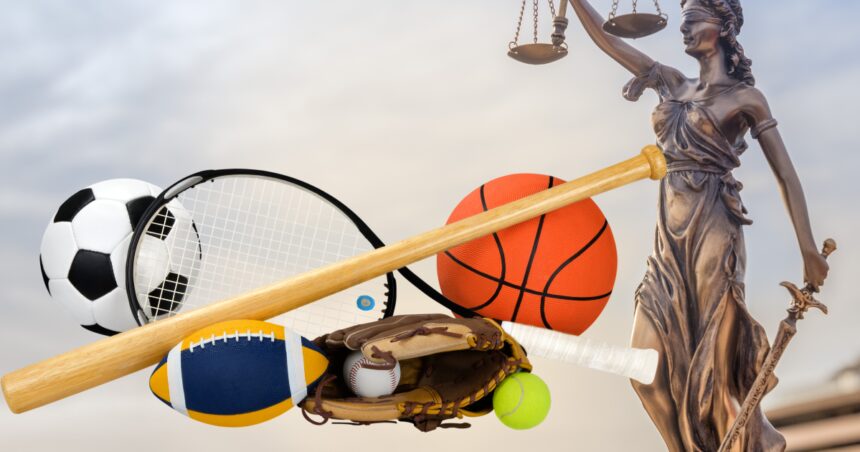Contracts in Sports Law: Introduction
The world of sports has become highly commercial and is well known for all the hype it generates around the world. The main ingredient behind the sports industry being so conventionally successful is the fact that it is run through the successful coordination of many individuals, organizations and companies. Sporting events are often characterized with appeal, glamor and entertainment but a lot goes on behind the scenes to make such events a gallant success.
The genesis of sports as a means of entertainment and profit has now shaped this phenomenon into an industry, that we call the sporting industry. The industry has a witnessed economic aspect, which provides customers with products, services, locations, and ideas relating to sport, fitness, or leisure time; also includes individuals, groups, and corporations who facilitate, promote, and plan sporting events. To protect such dimensions, and other crucial aspects of the sports industry, the existence of contractual law makes an important contribution.
Sporting events agreements are no different from agreements made in other areas of life. Just like everyone else, professional athletes receive a wage as payment for their services. The composition of pro players’ personal services contracts is examined in this section. Even amateur athletes, however, struggle with significant contract-related concerns.
Given the substantial increase in potential earnings in their sports, amateur players frequently face difficult decisions regarding switching from amateur to professional status. Some professional athletes receive much larger annual salaries than the majority of people do throughout their entire lifetimes.
Contract and Sports:
The majority of contractual issues in the world of sports in India are governed by the Indian Contract Act of 1872. This is because the sporting industry does not have a legislation that is dedicated entirely to governing sports, and also because the majority of the issues related to contracts across all industries come under the ambit of the Indian Contract act.
Most of the contracts in the sporting industry are express contracts, which means an agreement arises between two parties when they agree to the terms or conditions of the agreement through speaking words, expressing their actions or implications. There is no dimension for implied contracts in the sporting industry, this is because it is very hard to establish meeting of minds in a highly commercial space like that.
There are certain areas which a contract in the sporting world deals with. These might be:
- The exchange of media rights for a sporting occasion or contest. For instance, Star Sports is the only media outlet in India with the exclusive rights to broadcast the English Premier League.
- Promotional Rights. For instance, from 2017 to 2019, Oppo serving as the kit funder for the Indian Cricket Team.
- Rights and obligations for participation in important events or contests.
- The qualification of specific individuals or teams to participate in sports or events.
- Contracts between sportsmen and managers for management.
- Rights to membership in athletic groups or organizations.
Another important aspect of contracts in sporting law deals with the public nature of the agreements that are made in this industry. This is because mere announcement of a certain agreement can be highly beneficial for certain parties. For example, football clubs announce their new player signings; they make public announcements about very intimate details like the price and the tenure of the players that they have made a recent agreement with.
More times than often, these contracts are of value to the community of the sport that they are associated with, they might hold regulatory value to the league authorities or emotional value to the fans. Sporting communities often have a vested interest, either emotional or financial.
Contracts in Sports Law: Types of Contracts in the Sporting World
- Contracts for Providing Professional Service
These contracts are also known as the standard player contract. This means that these contracts can be used over and over again, without any change. They are referred to as boilerplate contracts because they contain generalized clauses and conditions that usually fit every situation, and mostly ever need some minor tweaks. All sportsmen receive the identical contract offer; the only regions where it varies are things like compensation and bonuses. This agreement may potentially be subject to revisions and addenda. But the fundamental framework seems to be the same. - Contracts for Advertisements, Promotions and Endorsements
Unlike the nature and structure of a contract for professional service, these contracts are unique and special and adjusted upon as per the need of the situation. This is because the terms and conditions of a contract mostly depend upon the type of endorsement that the player engages in. In connection with the promotion of the sponsor’s goods or services, it permits the use of the athlete’s name, photograph, or likeness. Additionally, under section 27 of the Indian Contract Act, 1872, a contract’s covenant that goes beyond the provisions of the agreement is void and unenforceable. - Appearance Contracts
As the name suggests, these contracts mostly deal with managing the public appearance of a celebrity athlete in public or any event that is visible to the public. Athletes may appear in public for different companies, teams, organizations or brands and might get paid for that or any other benefits that accompany them.
Contracts in Sports Law: Role of an Agent in a Sports Contract
- Player Agent Relationship is a very significant aspect of any sporting contract. A sports world is very volatile, this means a player can very easily be exploited by their employers and very well be taken advantage of, or can be dragged into scandals with or without their fault.
To protect themselves from such repercussions, players generally hire agents that protect and represent their best interests at all times. An agent manages every aspect of a contractual agreement for an athlete, this can be anything that ranges from wages to the duration of employment, and the public affairs of an athlete. An agent is someone who manages a player’s earnings, public relations concerns, and renegotiations. An athlete and an agent have a contractual duty. This makes the agent appear to act on the player’s interests. - Contract between a player and an agent is perhaps the most important aspect of a relationship between the player and the agent. Both parties enter into a contract inorder to best protect their interest, and also to flag out any obligation that they have towards each other. Generally, they consent to any sort of legal proceedings that may occur upon breach of the contract between them. These contracts are binding until the date of validity, or until either one of the parties revokes the contract.

Termination of a Sports Contract:
A contract can be legally canceled in this situation before its obligations and duties have been carried out. There are a variety of reasons why a sports contract may be dissolved, however in India the justification must center around one of the following four reasons:
- Through Performance;
- Expressly Agreed;
- Under the doctrine of frustration;
- due to a material breach.
The Indian Contract Act, 1872 and the precedents already established by the Indian judiciary are the foundations upon which the termination of a sports contract is founded.
Conclusion:
The dimension of contracts are underexplored but very vital to the functioning of the sports industry. Contractual obligations many times take an ugly turn in sports and render the vulnerable party absolutely helpless.
This is a very common situation for players that come from ethnic and/or racial minorities. Countries like England have made specific considerable changes to various legislations that accommodate sporting very conveniently, and are also trying to hold sporting authorities, like the Premier League accountable for their actions and are being asked to clearly justify any changes they make in their regulations.
In short, countries need to do better in order to better facilitate the success of this industry and also to make sure that the spirit of sporting is protected at all costs.
Latest Blog: Decoding Sporting Contracts: Navigating the Legal Landscape of the Sports Industry in India


4 thoughts on “Decoding Contracts in Sports Law: Getting Around the Legal System of the Sports Industry in India, Discover Detailed Information of Contracts in Sports.”